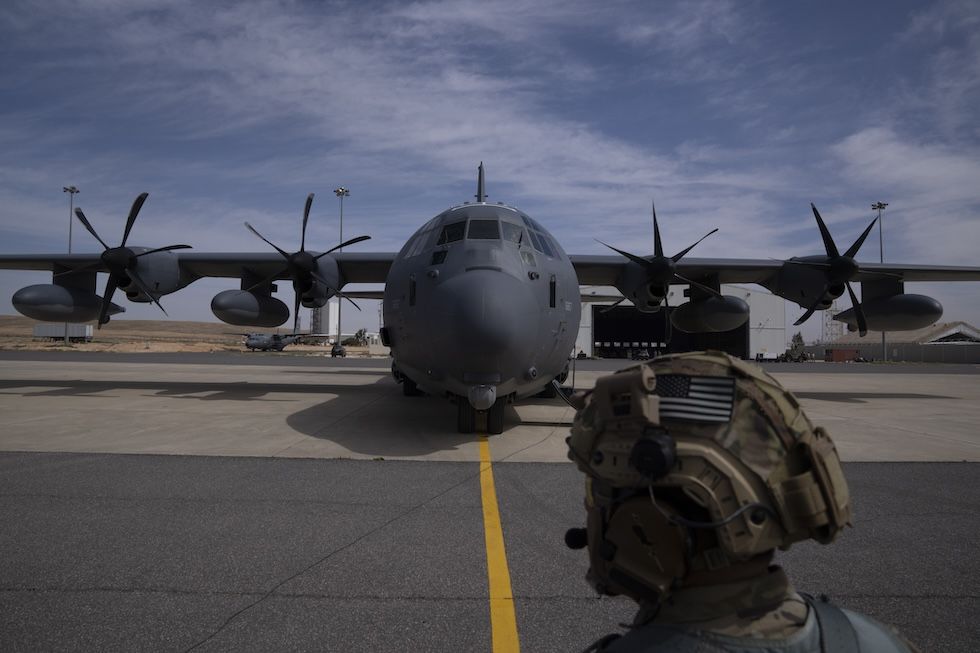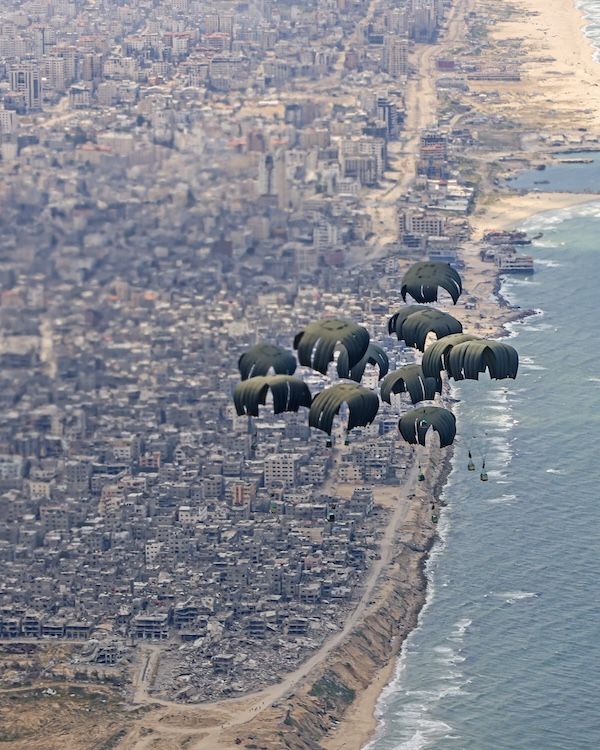King Abdullah II and Queen Rania of Jordan at Queen Elizabeth’s funeral in 2022. (Gareth Fuller/Pool Photo via AP)
After having shot down drones and missiles launched from Iran towards Israeli territory, it must navigate between its traditional closeness with the United States and the demands of its Palestinian population not to side with Israel
On Saturday night, Jordan’s air force helped shoot down 170 drones, 120 ballistic missiles and about 30 cruise missiles launched by Iran against Israel. Some of the drones and missiles were intercepted in Jordanian airspace, and the kingdom of Jordan was a somewhat unexpected part of the informal alliance that defended Israel, also made up of the United States, the United Kingdom and Saudi Arabia. In Jordan, the intervention in support of Israel has caused considerable controversy and criticism: a fifth of its population is Palestinian (2.3 million people), and an even larger portion is of Palestinian origin. The monarchy, already facing internal criticism for not doing enough for the Palestinian cause, said it shot down the Iranian drones not to defend Israel, but to preserve its own airspace. However, photomontages have begun to circulate on social media showing Abdullah II, the Jordanian king, dressed in the uniform of the Israeli army.
Jordan participated in two wars against Israel, in 1948 and in the Six Day War of 1967, and partially in a third, the Yom Kippur War in 1973. Starting from the end of the 1980s, the governments of the two countries engaged in negotiations diplomatic relations which in 1994 led to the normalization of relations and the recognition of Israel by Jordan.
Jordan belongs to a bloc of Sunni Arab countries that opposes the growing influences of Shiite Iran in the region (Shiism and Sunnism are the two main orientations of Islam). At the same time, for historical, cultural and demographic reasons, it maintains a radical opposition, at least rhetorical, to Israel’s policies and a closeness to the Palestinian cause. This closeness has not always translated into concrete actions, even if during the ongoing war the Jordanian government has made efforts to encourage the arrival of humanitarian aid. It should also be considered that Abdullah II’s wife, Rania, was born in Kuwait to Palestinian parents.
Jordan is a small and relatively poor country, whose economy depends largely on aid from the United States and investments from wealthy Gulf countries such as Saudi Arabia. At the same time, the royal family has a centuries-old history and numerous elements that make it one of the most prestigious in the region: the Hashemite dynasty, that is, the royal dynasty, according to tradition descends directly from Muhammad.
Formally, Jordan is a constitutional monarchy, but in reality the king has extremely broad executive and legislative powers. He appoints the prime minister, the Senate and the Constitutional Court and is the commander in chief of the army. Jordan is one of the most stable countries in the region, relatively religiously moderate and not hostile to the West. It is not a truly democratic country: elections (for the House) are only partially free, the media and civil rights are limited.

A plane at a US base in Jordan (AP Photo/Leo Correa)
Jordan is also geographically very important: it borders Israel, Syria, Iraq, and for this reason it has often had very important diplomatic roles. It has long felt threatened by the presence of pro-Iranian groups in Iraq and Syria and hosts a large community of Palestinian exiles: the authorities fear that it could grow further following the ongoing war in the Gaza Strip.
Its relations with Iran are tense and conflictual: in 2004 the Jordanian king was the first in the Arab world to denounce the danger of a “growing Shiite influence” in the Middle East, and over time the Jordanian authorities have carried out targeted actions to limit pro-Iranian groups in the region (although less intensely than in other countries). In recent months the Jordanian army had collaborated in shooting down rockets and missiles launched towards Israel by pro-Iranian militias operating in Iraq and Syria, as well as those coming from Yemen and launched by the Houthis (also allies of Iran ).
The relationship with Hamas is particularly complex: one of King Abdullah II’s first acts when he came to power in 1999 was to expel the “political offices” of the organization which had moved to Jordan in 1990 (today they are in Qatar). Since then there have been no overtures, but diplomatically the Jordanian authorities avoid overly open criticism of the radical Palestinian group, which has discreet support within the Jordanian Palestinian community. Some demonstrations in favor of the Palestinian cause in recent months have also been violently repressed by the police.

Humanitarian aid parachuted into Gaza from planes departing from Jordan (Photo by AS1 Leah Jones/MOD via Getty Images)
Jordan’s policy seems to be driven mainly by opposition to Iran and collaboration with the United States: it receives military and economic aid from the US government, hosts American military bases with hundreds of soldiers and has recently requested to obtain the Patriot anti-missile system. At the same time, Jordan has the goal of keeping the Middle East stable and “at peace.”
Opposition to Iran and common membership in the Sunni group have brought Jordan closer to Saudi Arabia, with which it had had a close but sometimes turbulent relationship for years. The marriage between Jordanian Crown Prince Hussein and Rajwa Alseif, who is part of one of the richest and most influential families in Saudi Arabia, seems to have begun a new phase. Saudi Arabia is experiencing a phase of diplomatic rapprochement and détente with Israel (currently on an unofficial level and slowed down by the war in Gaza). They are positions similar to those of Jordan, but with much greater economic means, which could also be used to guarantee support for the Palestinian cause: the Gulf countries have already offered to finance the reconstruction of Gaza after the war.
– Read also: The remarkable informal alliance that defended Israel from Iranian attack
Continue on the Post
Tags: Jordans difficult position Post







